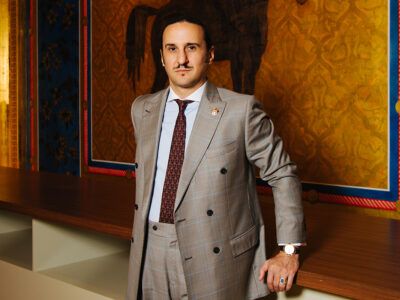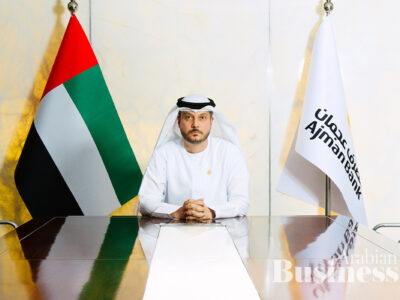Two months before the scheduled interview with Yogesh Mehta, I am by complete coincidence sitting across the aisle from him on an Emirates flight to Dubai. The Petrochem Middle East boss, who created a multi-billion-dollar chemical distribution empire from scratch, is heading back from London after a weekend getaway with a group of other Indian billionaires.
And no expense is spared. Mehta’s personal chef is also travelling with him. Shortly after take-off, the two of them walk across to me, with a plate of exquisite food.
“Try this. It’s not just a taste, it’s an experience, it’s an incredible journey into places you never thought existed,” he explains.
The same could be said about Yogesh Mehta’s remarkable career, which has tasted more than its fair share of success. He arrived in Dubai in 1990, with empty pockets and big dreams. Living in the spare room of a friend’s apartment, he spent hours in a local library researching the chemical distribution market in the region. Five years later, his newly formed Petrochem Middle East had already built a state-of-the-art distribution terminal in Jebel Ali. By 1999, he had $5 million in the bank and “had made it”.
Today, the company brings in $2 billion a year in revenues, is the biggest chemical distributor in the Middle East, and the twelfth biggest on the planet. The firm is also embarking on a seismic change by entering the manufacturing side of the industry.
Mehta, soon to be 65, has along the way become one of the most famous, popular, respected, and successful Indians to make it big in Dubai. The chemicals business has been a platform for a multitude of other activities, including leading the construction of the iconic Hindu Swami Narayan Temple in Abu Dhabi. His philanthropic activities have resulted in significant contributions to dance, music, and theatre – and in a few years’ time, he plans to open “Yogi’s”, his first restaurant in Dubai.
For a man who earned AED2,000 a month when he started out in Dubai, to a billionaire who often has Bollywood superstars and music legends performing private concerts in his back garden, things have gone rather well for him. But, in a remarkably candid interview, Mehta admits change is coming – not just the transition of power to his son Rohan, but his own eventual exit from the empire.
“I’m having so much fun, but it’s time to slow down and enjoy other things in life. I have become a little impatient, a little spaced out, and maybe the passion to make money isn’t there. Not because I made enough, I made it long ago,” he says, adding: “My remaining years I want to play golf, listen to music, and give back. I am not so interested in doing the things I have done in the past. I don’t want to be sitting in a chair where someone tells me: ‘Sir, it’s not your chair, it’s time to get up.’ I want to get up before that. I don’t want to be on a stage that’s not my stage.”
It is unlikely anyone will ever get the chance to tell him to move chairs, as he is already doing that. His only son Rohan is being groomed to take over as managing director, whilst his Group Commercial Director Venu Nayar will take the pivotal role of CEO. Yogesh Mehta himself will step up to the position of Founder/Chairman, though with limited and eventually zero involvement in the daily running of the company.
The next generation of Petrochem leaders will be taking a gem of a business, that is on the road to two major milestones: the completion of a new $80 million state-of-the-art bulk chemical storage terminal in Jebel Ali – bigger and better than the original – and, over the coming years, a shift from being a distributor to a manufacturer of chemicals.
He credits the way the UAE has supported the implementation of the CEPA (Comprehensive Economic Partnership Agreement) with India for this – coupled with the massive increase in freight costs, and the resultant cost of living crisis.
“Thanks to CEPA it means I can manufacture here, and the buyer will pay 2.5 percent less duty, so there is a duty rebate – freight is less and just on time delivery. So, we said let us manufacture niche chemicals in small quantities, and it’s great that the UAE is supporting the industry. We are now building the terminal and storage capacity and by the end of the second half of this year, we should be there,” he says, adding: “Our business will have a quantum shift from distribution to manufacturing. Right now, we are 70 percent chemical distribution, 30 percent traders. Soon we will be 60 percent manufacturing and 40 percent between distribution and trading. It’s a massive shift. The world is smaller, shorter and quicker. The buyer is very efficient, we need to deliver value that the chemical buyer can’t get elsewhere. This is the 5-year plan.”
It also helps that Petrochem is finalising its new terminal. “We will use our storage capacity for manufacturing. A ship can arrive, within 30 minutes connect the hose and within two hours I have the goods in my tank. And that’s really efficient. Usually, this can take three days.”
But while Mehta is already planning for the future, he is quick to admit that right now, huge challenges lie ahead for the entire industry. His company has seen staggering growth since inception – the most spectacular of which actually came during the Covid years, given its involvement in the distribution of chemicals needed to combat the pandemic. Though right now, he admits the industry is in the middle of a “long dark night,” which has resulted in his profit margins falling from 3.5 percent to nearer 2 percent.

“I can’t sit here and pretend everything is all hunky dory. The chemicals business of the world is oversupplied right now. India and China are huge in capacity with billions of people, but they have oversupplied. China has overbuilt in capacity with nowhere to sell. Europe is suffering with the political situation; the UK has gone backwards post-Brexit. The US used to have a big gasoline season from February to June, during the driving season when people are travelling nationwide. But this year there is no demand, people don’t want to spend – inflation is upon us, recession is upon us, high interest rates are killing the industry. These are factors that make for a very poor business environment, the chemical business is facing a recession worldwide,” he explains.
Mehta adds: “Our business model works when next month’s prices are higher than the previous month, as I am buying two months in advance. When my product arrives now and the next month is cheaper than this month, how do we survive? These are challenging times. Which part of the dark night are we in? I would say in the middle of it.”
And it is in the middle of this long dark night that Mehta is now starting to hand over power to his son Rohan, who has worked at the firm for 10 years. An Honours graduate in Economics from Northeastern University, Boston, and now a Harvard Business School Alumni, he spent two years in Dallas, TX gaining international experience and exposure at OQ Chemicals (formerly Oxea Chemicals) before returning to his hometown of Dubai and starting his journey at Petrochem.
That said, he has very, very big shoes to fill. Can he do so, given the challenges the industry now faces? “Well, he’s had it easy so far. I will gently help him in the coming three to five years. We will take this company to the next level before I call it quits. I will get two or three portfolios. I will look at the expansion of the terminal, bring on board the required talent and I will keep an eye on the money.”
Which all sounds fine, but what happens when Mehta senior wants to change the direction Mehta junior is heading in? Is he the father or the boss?
“I have to confide in you, many times my son has said things and I have gone to the bathroom and beaten my head up, rather than tell him things. We’ve had our healthy disagreements. We’ve had our different ways. But he understands certain things need to be done, I feel it is more a generation gap which we both bridge from time to time,” Mehta says.

So, it’s not all been roses and sunshine? “The younger generation, they have a different thought process, his process is more corporate, and mine is more soulful. His way is to get people to run it, give them accountability and let them be. For me it’s get corporate people, work with them, lead them and grow them. We have different styles. I live with my soul and heart and gut. Rohan is more corporate. When it comes to work, I guess he’s a little less soulful and more practical so, possibly I wear the founder’s hat and he the intelligent scion.” Mehta does add that he has absolutely full confidence that his son and the senior, able and trusted Petrochem team will take the company to the next level. Whether that level is an eventual sale, an IPO, or in the next decade adding a more outside corporate structure, only time will tell.
As for himself, he points out that even though he turns 65 this month, “my youth and exuberance is huge, especially after 6pm. I am going to Lake Como to play golf and hiking. I don’t have time to think about slowing down in life. I haven’t even opened the books I want to read. I have a golf institute and a wellness institute to run as well.”
It wasn’t always this way. The journey to the top has not been easy – at the very outset, he was forced to sell his wife’s jewellery just to pay the bills. In 1999, the company was doing so well, he finally realised he had turned a corner and was never going to look back again. “I remember the moment, I had seen $5 million in the bank and I felt now I have arrived. Now I can look after my family.” Did he celebrate? “Oh yes, we bought the jewellery back and more!”
Did he celebrate? “Oh yes, we bought the jewellery back and more!”
The secret to his success, he says, is to dream big – but realistically. “When I had no money, I knew I was going to be a tycoon. My dreams have come true. I don’t dream about going to the moon. I need to see the goalposts and yes, I tend to move them, but I move it to what I can see. My sky does have a limit!”
Mehta has certainly seen his fair share of ups and downs, but through it all – as even his toughest competitors would be quick to confirm – his reputation for doing things right, clean, and with ethics has remained intact from day one.
“You need to be a good soul and a good human to succeed. Many people do good only for themselves. I have never cheated anybody. I am a good guy. I don’t owe anybody anything. How many thieves are around us? Many. You know many, I know many,” he states.
Indeed, Mehta admits he has many concerns for the direction that society as a whole is heading in, especially with the growth of social media. “We have started living in a fake society where instant gratification is key, our dopamine levels are forever changing, and we need quick fixes. Soulfulness is out of the window, families are behaving very differently because of the social media influence, and children are growing up in a new world that is very different to my world.”
Does he worry for future generations? “We are living in very uncertain times, where the competition is going to come from AI and people are not prepared for it. The laws are not yet ready. The real world needs a human touch, human hand, and human cheer. Where is all that? Anxiety is killing us,” he explains.
For anyone looking for the human touch and human cheer, they would be well advised to drop in at Mehta’s next venture – the opening of his first ever restaurant, “Yogi’s.” While the exact location in Dubai South is being finalised, it will serve lavish Indian food, with live music acts performing. Food and music are his passion, and he says the restaurant, which will take another three years to complete, is being done so he and his friends – and any guests – can have a good time. It’s passion before profit.
He says: “I don’t want to make money from this. Do you know how much love is exchanged over food? I hope people come to Yogi’s. I hope they come to me. I will be there every evening.”
Whatever happens to the chemicals industry, and whatever direction his son takes Petrochem Middle East in, one thing is certain – Yogi’s will be packed every night.

The secret to his success, he says, is to dream big – but realistically. “When I had no money, I knew I was going to be a tycoon. My dreams have come true. I don’t dream about going to the moon. I need to see the goalposts and yes, I tend to move them, but I move it to what I can see. My sky does have a limit!”
Mehta has certainly seen his fair share of ups and downs, but through it all – as even his toughest competitors would be quick to confirm – his reputation for doing things right, clean, and with ethics has remained intact from day one.
“You need to be a good soul and a good human to succeed. Many people do good only for themselves. I have never cheated anybody. I am a good guy. I don’t owe anybody anything. How many thieves are around us? Many. You know many, I know many,” he states.
Indeed, Mehta admits he has many concerns for the direction that society as a whole is heading in, especially with the growth of social media. “We have started living in a fake society where instant gratification is key, our dopamine levels are forever changing, and we need quick fixes. Soulfulness is out of the window, families are behaving very differently because of the social media influence, and children are growing up in a new world that is very different to my world.”
Does he worry for future generations? “We are living in very uncertain times, where the competition is going to come from AI and people are not prepared for it. The laws are not yet ready. The real world needs a human touch, human hand, and human cheer. Where is all that? Anxiety is killing us,” he explains.

For anyone looking for the human touch and human cheer, they would be well advised to drop in at Mehta’s next venture – the opening of his first ever restaurant, “Yogi’s.” While the exact location in Dubai South is being finalised, it will serve lavish Indian food, with live music acts performing. Food and music are his passion, and he says the restaurant, which will take another three years to complete, is being done so he and his friends – and any guests – can have a good time. It’s passion before profit.
He says: “I don’t want to make money from this. Do you know how much love is exchanged over food? I hope people come to Yogi’s. I hope they come to me. I will be there every evening.”
Whatever happens to the chemicals industry, and whatever direction his son takes Petrochem Middle East in, one thing is certain – Yogi’s will be packed every night.






